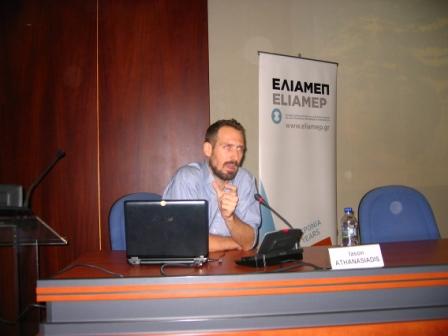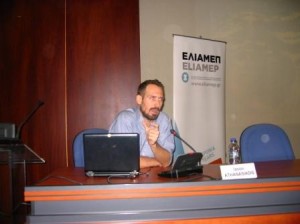The Hellenic Foundation for European and Foreign Policy (ELIAMEP) organized on July 13th at the Ministry of Foreign Affairs, a lecture delivered by Mr. Jason Athanasiadis, reporter and photographer of the Washington Times, who was recently released from Tehran prison. Jason Athanasiadis delivered to the audience his personal testimony of the events before and after Iranian elections and described vividly his personal adventure. Athanasiadis was arrested from Iranian police on the allegations of espionage. The sentence for such actions varies from 10 years to death penalty. He was the first foreign journalist being imprisoned in the last 20 years, while 41 fellow reporters are now being held in custody by the Iranian regime, in a massive fear tactics campaign towards media and press.
Jason accounted his story without exaggerations or dramatic escalations, in a rather humorous way. He traced his memory back to his first visit in Tehran in 2004 as a student at the Graduate Program of the Iranian Ministry of Foreign Affairs recalling the freedom of movement as a reporter and photographer during the reformist era of President Khatami, in total contrast with the fear he felt keeping notes in English – written from left to right while Farsi right to left- during the night of elections, a possible sign that he works for a foreign “enemy”.
The description of Tehran as a town that waited for change was soon to be altered by the first information declaring Ahmadinejad a winner from the first round. He decided to move to Kom, Iran’s sacred town, to capture the moments of the winning side. An arrest in Kom for taking pictures sent him back to Tehran, a city now buried in darkness and a stressing traffic. “Is it possible 40 million votes to be counted in 12 hours?” he wondered with his colleagues. Early morning after the elections, a massive crowd of Mousavi followers begins to gather at the main squares of Tehran. A silent demonstration begins unfolding. When somebody yells, the rest ask him to hush. The ideology police starts the fight against the crowd rampaging cars in the middle of the streets, people standing by at the squares, women and Mousavi supporters. He declines to be the first reporter to send such news to the rest of the world. Jason has to abandon Tehran because his visa expires after 7 days. Police arrests him at the airport. His interrogators face him with courtesy, probably because he has also a Greek passport, since the point of friction seems to be his British one. Uncertainty for what would follow becomes the major feeling. The immediate intervention of the Greek Embassy in Tehran and the soft diplomacy used was very much appreciated by the Iranian side and led to his release after 21 days.
Jason approaches the current political situation in Iran in a rather realistic way despite being held in prison. Ahmadinejad has won the lower layers of society with the money he spent in rural areas and in infrastructure projects out of Tehran. People wanted to be governed not from another mullah but from a man that had a technocratic background – he was the mayor of Tehran – and could respond to everyday problems of his people. He restored Iran’s prestige with the nuclear program and committed to a security state reinforcing the ideology police. According to Jason, right now Iran faces a cultural war, tradition against modernization, but always in the context of Islamic theocracy. With the recent elections, there was ground for a velvet revolution. However, the re-election of Ahmadinejad highlights the triumph of the establishment. The government has suppressed violently the voices of protesters and everyday life is militarized. Today is history, tomorrow is a mystery for Iran.
And what about Greece? Can Greece play a mediatory role between major powers and Iran? According to Jason Greece is an influential country due to its historical and cultural background. The crossroads from West to East and vice versa. An open window to the EU which is using the heavy rhetoric of Britain, France and Germany according to Iranians. Can Greece become the fair partner that Iran is seeking?
Professor Loukas Tsoukalis, President of ELIAMEP,moderated the discussion.
Iason Athanasiadis CV




